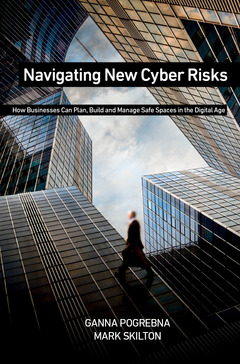Description
Navigating New Cyber Risks, 1st ed. 2019
How Businesses Can Plan, Build and Manage Safe Spaces in the Digital Age
Language: English
Publication date: 08-2020
231 p. · 15.5x23.5 cm · Paperback
Publication date: 06-2019
231 p. · 15.5x23.5 cm · Hardback
Description
/li>Contents
/li>Biography
/li>Comment
/li>
This book is a means to diagnose, anticipate and address new cyber risks and vulnerabilities while building a secure digital environment inside and around businesses. It empowers decision makers to apply a human-centred vision and a behavioral approach to cyber security problems in order to detect risks and effectively communicate them.
The authors bring together leading experts in the field to build a step-by-step toolkit on how to embed human values into the design of safe human-cyber spaces in the new digital economy. They artfully translate cutting-edge behavioral science and artificial intelligence research into practical insights for business.
As well as providing executives, risk assessment analysts and practitioners with practical guidance on navigating cyber risks within their organizations, this book will help policy makers better understand the complexity of business decision-making in the digital age.
Step by step, Pogrebna and Skilton showyou how to anticipate and diagnose new threats to your business from advanced and AI-driven cyber-attacks.
Introduction.- Cybersecurity Threats: Past and Present.- A Sneak-Peak into Motivation of a Cybercriminal.- Wake Up: You are the Target!.- Existing Solutions Summary.-Cybersecurity Business Goals and Stories Around Them.- Communication, Communication, Communication.- Future Threats.- Future Solutions.- Social and Ethical Aspects.- The Next-Generation Cybersecurity.- PLAN to Respond and Contain Threats.- How do we BUILD Solutions?.- How to MANAGE Threats?.- In Place of a Conclusion.
Ganna Pogrebna is a Fellow at the Alan Turing Institute and a top Professor in Behavioral Economics and Data Science at the University of Birmingham, UK. She currently leads a strand on Behavioral Data Science at the Alan Turing Institute and her work on behavior and risk perceptions was acknowledged with multiple honors in the UK and globally including the Leverhulme Trust Award in 2012 as well as the British Academy of Management Award in 2018. In her work as a consultant she offers advice to businesses and policymakers, helping them to develop strategies for managing technological, behavioral, as well as cyber risks. Her recent projects focus on smart technological and social systems, cybersecurity, human-computer interaction, human-data interaction and business models.
Mark Skilton is Professor of Practice in Information Systems Management at Warwick Business School, UK. He has over thirty years’ experience in business technology consulting in over twenty countries and cross-industries, specializing in digital strategy and advanced technology innovation, design and adoption. He is the author of several books, including The 4th Industrial Revolution and Building Digital Ecosystem Architectures (both with Palgrave). He is a frequent speaker in the international media and has contributed to publications including the Financial Times, Wall Street Journal, New York Times, Washington Post, Daily Mail and Bloomberg, Reuters, the Associated Press, Forbes, NewScientist, Nature and Scientific American. He has appeared on the BBC, Sky, ITV, Al Jazeera and others. His research and advisory work includes CxO practices for digitization, productivity, cyber, Internet of Things and Automated Intelligence.




